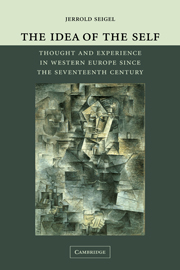Book contents
- Frontmatter
- Contents
- Acknowledgments
- PART I INTRODUCTORY
- 1 Dimensions and contexts of selfhood
- 2 Between ancients and moderns
- PART II BRITISH MODERNITY
- PART III SOCIETY AND SELF-KNOWLEDGE: FRANCE FROM OLD REGIME TO RESTORATION
- PART IV THE WORLD AND THE SELF IN GERMAN IDEALISM
- PART V MODERN VISIONS AND ILLUSIONS
- Notes
- Index
1 - Dimensions and contexts of selfhood
Published online by Cambridge University Press: 05 June 2012
- Frontmatter
- Contents
- Acknowledgments
- PART I INTRODUCTORY
- 1 Dimensions and contexts of selfhood
- 2 Between ancients and moderns
- PART II BRITISH MODERNITY
- PART III SOCIETY AND SELF-KNOWLEDGE: FRANCE FROM OLD REGIME TO RESTORATION
- PART IV THE WORLD AND THE SELF IN GERMAN IDEALISM
- PART V MODERN VISIONS AND ILLUSIONS
- Notes
- Index
Summary
Few ideas are both as weighty and as slippery as the notion of the self. By “self” we commonly mean the particular being any person is, whatever it is about each of us that distinguishes you or me from others, draws the parts of our existence together, persists through changes, or opens the way to becoming who we might or should be. From knowledge of what the self truly is people have hoped to gain greater happiness, deeper fulfillment, liberation from fetters or restraints, better relations with other people, or ways to achieve power over them. Selfhood thus matters to us both as individuals and as social creatures, shaping our personal existence and our relations with those whose lives we somehow share.
But what is this self whose understanding seems to promise so much? Many practically minded people hardly think the question worth posing, knowing well enough who they are for their purposes, thank you, while those who offer answers to it often do so for expedient or self-interested reasons: to support a political program, validate a religious belief or practice, foster or oppose some social policy, justify failings or pretensions, or establish a claim to therapeutic power. The nature and meaning of the self are subject to constant redefinition, as it is ever-again taken up on behalf of some partisan aim or project. And yet the question does not lose its force from being appropriated in these ways.
- Type
- Chapter
- Information
- The Idea of the SelfThought and Experience in Western Europe since the Seventeenth Century, pp. 3 - 44Publisher: Cambridge University PressPrint publication year: 2005
- 1
- Cited by

